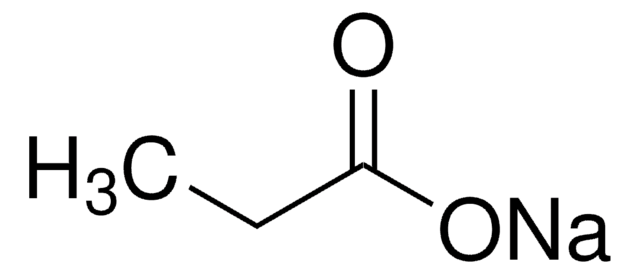S7545
Sodium acetate
BioXtra, ≥99.0%
Synonym(s):
Acetic acid sodium salt
About This Item
Recommended Products
product line
BioXtra
Quality Level
assay
≥99.0%
form
solid
autoignition temp.
1112 °F
impurities
≤0.0005% Phosphorus (P)
<0.01% Insoluble matter
pH
8.5-9.9 (25 °C, 246 g/L)
pKa
4.76 (acetic acid)
mp
>300 °C (dec.) (lit.)
solubility
H2O: 1 M, clear, colorless
anion traces
chloride (Cl-): ≤0.002%
sulfate (SO42-): ≤0.003%
cation traces
Al: ≤0.0005%
Ca: ≤0.005%
Cu: ≤0.0005%
Fe: ≤0.0005%
K: ≤0.03%
Mg: ≤0.0005%
NH4+: ≤0.05%
Pb: ≤0.001%
Zn: ≤0.0005%
SMILES string
[Na+].CC([O-])=O
InChI
1S/C2H4O2.Na/c1-2(3)4;/h1H3,(H,3,4);/q;+1/p-1
InChI key
VMHLLURERBWHNL-UHFFFAOYSA-M
Looking for similar products? Visit Product Comparison Guide
General description
Application
- in the isolation of DNA from bacterial samples of the human gastrointestinal tract
- as a component of RNA elution buffer for the preparation of infrared (IR) fluorescent probes in northern blot technique
- in the lysis buffer for cellular lysis to detect reversible oxidation of protein tyrosine phosphatases (PTPs) with the cysteinyl-labeling assay using IMR90 fibroblasts
Storage Class
11 - Combustible Solids
wgk_germany
WGK 1
flash_point_f
Not applicable
flash_point_c
Not applicable
ppe
Eyeshields, Gloves, type N95 (US)
Choose from one of the most recent versions:
Certificates of Analysis (COA)
Don't see the Right Version?
If you require a particular version, you can look up a specific certificate by the Lot or Batch number.
Already Own This Product?
Find documentation for the products that you have recently purchased in the Document Library.
Customers Also Viewed
Our team of scientists has experience in all areas of research including Life Science, Material Science, Chemical Synthesis, Chromatography, Analytical and many others.
Contact Technical Service






